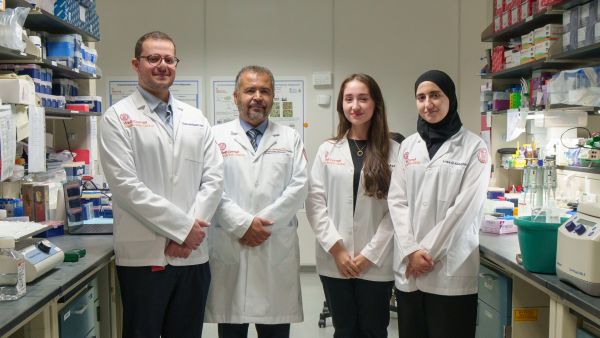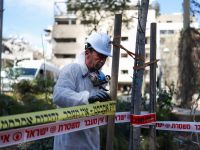WCM-Q students spend summer conducting research in Qatar, US, UK and South Korea

Students at Weill Cornell Medicine-Qatar (WCM-Q) gained valuable experience of biomedical research during the summer recess by joining laboratories at elite international universities including Imperial College London, Weill Cornell Medicine in New York, and Houston Methodist Hospital in Texas.
Thirty-seven WCM-Q medical students completed summer research projects as part of the college’s Advanced Biomedical Sciences Research (ABSR) elective course, which offers students the opportunity to pursue a personal scholarly experience in biomedical science.
The ABSR elective is open to students who have completed the first year of the medical curriculum and wish to graduate with honors in research and develop their scientific investigation and clinical research skills. A student-initiated program, the ABSR invites interested students to submit research proposals for consideration, develop working relations with prospective mentors, and secure invitations to visit and collaborate on research projects. The program, which lasts eight weeks, offers a variety of experiences, including clinical research, laboratory research, social science, public health projects, and other translational projects. A total of 37 WCM-Q students completed research projects as part of the ABSR this summer. The majority of these students were awarded the Medical Student Research Award (MSRA), provided by the WCM-Q Research Division, to support their travel.
Student Ubaida Al-Aani joined the laboratory of Dr. Mehraneh Jafari, director of clinical research in the Colon and Rectal Surgery Division at NewYork-Presbyterian Hospital/Weill Cornell Medical Center. Throughout his time, Ubaida was involved in a number of projects including clinical trials working with novel surgical devices, early phase studies investigating cell therapies for chronic conditions, and population studies investigating socioeconomic factors impacting healthcare adherence. Ubaida said that this was a transformative time in his education and research career as he received first-hand exposure to the fast-paced, high-demand lifestyle of clinical research and gained several new skills he feels will benefit him as he progresses in his career and continues his research journey.
Dr. Nayef Mazloum, associate professor of microbiology & immunology/associate dean for student research at WCM-Q, said: “The advanced biomedical sciences research elective course is an excellent way for our students to develop a number of important attributes, including critical thinking skills, an appreciation of the scientific method, and the ability to develop collaborative relationships with researchers and mentors. Doing this at an early stage in their career helps a student to become well-rounded physician-scientists who are able to move beyond mastery of the material they encounter in their studies to apply that knowledge in research and clinical settings in ways that improve patient care.”
By conducting a small research project, the students gain critical judgment in evaluating research evidence and its application to patient care, as well as having the experience of joining a new laboratory at a different institution.
Student Sama Ayoub joined the laboratory of Dr. Xiaojing Ma at the William Randolph Hearst Microbiology Research Center of Weill Cornell Medicine in New York to pursue research focused on cell senescence and cell cycle arrest to enhance anti-tumor immunity, the body's natural defense mechanisms that target and eliminate cancer cells.
Sama said: “Regulatory T cells (Tregs) are essential for maintaining immune balance, but in cancer, they are often co-opted to suppress anti-tumor responses. This summer, I joined Dr. Ma’s lab at Weill Cornell Medicine–New York to investigate the role of the E3 ubiquitin ligase UBR5 (an enzyme encoded by the UBR5 gene) in controlling Treg function within the tumor microenvironment. I used western blot, cell culture, flow cytometry and so on -techniques I was already familiar with from previous lab work - but applying them to this new immuno-oncology context was incredibly exciting. It was fascinating to see how manipulating a single gene in Tregs could impact tumor progression and immune suppression. This research has important implications for developing future cancer immunotherapies that selectively disable suppressive Tregs without triggering autoimmunity.
“I really enjoyed the experience because I grew more appreciative of molecular research’s impact on clinical outcomes and it solidified my passion for combining scientific inquiry with clinical practice. My takeaways for the summer were not only stronger technical skills but also a clearer sense of how discovery research can shape the future of medicine.”
Student Lolwa Al-Abdulghani spent the summer at the National Heart and Lung Institute of Imperial College London in the laboratory of Dr. Graeme Miles Birdsey, Associate Professor (Senior Lecturer) in Vascular Science, using experimental genomic approaches to better understand the causes of primary lymphedema.
Lolwa said: “Primary lymphedema is a rare genetic disease caused by abnormal development of the lymphatic system, which is the network of vessels that drains excess fluid from the body. The Birdsey group and their collaborators have recently described how inherited variations in the ERG gene cause primary lymphoedema in some patients. Conducting this research gave me hands-on experience with advanced laboratory techniques, such as growing lymphatic vessel cells in the lab and editing their DNA to mimic the types of changes seen in the patient’s cells. This experience has provided me with a new perspective on my clinical work, highlighting the important contribution that discovery research plays in uncovering fundamental knowledge in medicine. By understanding the science behind diseases, I will be able to apply these research insights directly to the care of my patients as a physician.”
Other students joined labs at University College London, Zenith Hospital in Ulsan, South Korea, Hamad Medical Corporation in Doha, and Houston Methodist Hospital in the US. Students investigated a wide range of research areas, including rehabilitation medicine, inflammation and rare diseases, nephrology, obstetrics and gynecology, neurological surgery, microbiology and immunology, hematology, oncology, infectious diseases, otolaryngology (head and neck surgery), plastic surgery, pathology and laboratory medicine, among many others.
Dr. Mazloum added: “These summer research experiences contribute to an important pillar of our mission at WCM-Q, which is to produce accomplished and innovative physician-scientists equipped with the skills and outlook to advance medicine in the modern era.”
Background Information
Weill Cornell Medical College in Qatar
Weill Cornell Medicine - Qatar is a partnership between Cornell University and Qatar Foundation. It offers a comprehensive six-year medical program leading to the Cornell University M.D. degree with teaching by Cornell and Weill Cornell faculty and by physicians at Hamad Medical Corporation (HMC), Aspetar Orthopedic and Sports Medicine Hospital, the Primary Health Care Corporation, the Feto Maternal Center, and Sidra Medicine, who hold Weill Cornell appointments. Through its biomedical research program, WCM-Q is building a sustainable research community in Qatar while advancing basic science and clinical research. Through its medical college, WCM-Q seeks to provide the finest education possible for medical students, to improve health care both now and for future generations, and to provide high quality health care to the Qatari population.






